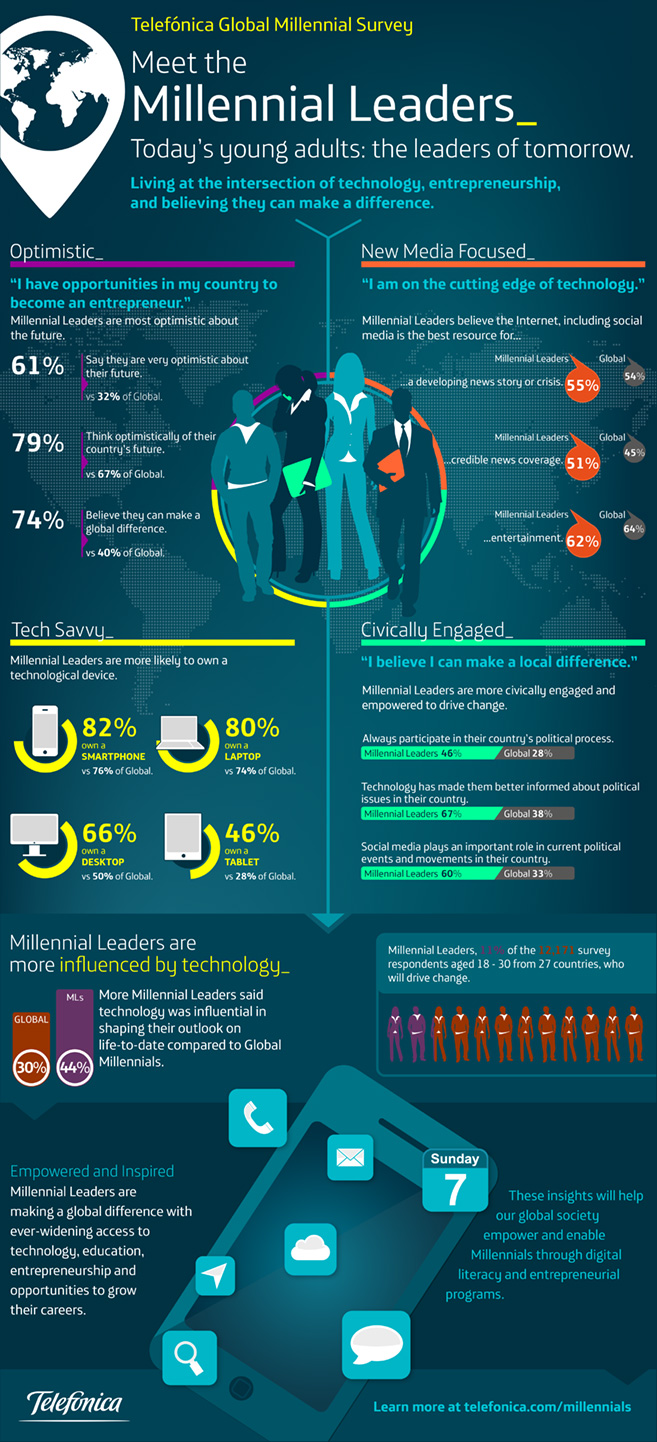![face_collection_by_starsandpolkadots-d51a2gr700x300, Changes Millennial Leaders Represent [Infographic]](https://www.business2community.com/wp-content/uploads/2013/07/face_collection_by_starsandpolkadots-d51a2gr700x300.jpg)
What characterizes the Millennial leaders emerging from this generation? What makes them tick?
Early in 2013, Telefonica partnered with The Financial Times to undertake “the largest and most comprehensive” global survey ever of 18-30 year olds (over 12,000 people across 27 countries, in 6 regions).
The results make fascinating reading. Here are the key themes:
Technology and Education
Millennials are defined by their ubiquitous use of technology and belief that an education in technology will ensure personal future success – constantly connected, constantly online.
They believe that technology makes it easier to get a job, creating more opportunities for all (although it has widened the gap between rich and poor) and makes language barriers easier to overcome.
The growth of MOOCs (mass online open courses) is a potential indicator of the tectonic plates shifting in education, in conjunction with the ubiquity and speed of progression in mobile technology.
Technology and the New Gender Gap
Millennial men and women value the role and impact of technology differently in their lives. More men than women consider themselves “on the cutting-edge of technology” and say that technology has been influential in shaping their outlook on life and say that technology is the most important field of study to ensuring future success.
This leaves me to wonder if technology is unwittingly helping to perpetuate the glass ceiling.
Government, the Economy and the Environment
Millennials are concerned about the health of the economy as well as of the planet. Many do not believe their values and beliefs are represented adequately by their governments.
It remains to be seen how this will play out in organizational terms.
Opportunity, Progression and Personal Freedom
Millennials value entrepreneurship, but express concern about the progression from school to the workplace. They believe strongly in protecting personal freedoms and are tolerant of other religious beliefs. They have strong expectations for personal freedoms and privacy, but many believe a decent paying job is a “privilege.”
Is this a strong rebuff to the oft-quoted ‘entitlement’ of this generation?
Millennial Leaders
The next wave of leaders – Millennial Leaders – is the 11% who are most likely to drive global change. They are strongly influenced by
- access to technology, and
- a passion to participate in solving challenges facing communities and the world. For example they feel they can make a difference locally.
Millennials are also driven to succeed. They characteristically seek opportunities in their country to become an entrepreneur or develop and bring an idea to market.
In the results, cultural differences show up starkly. Although the US and the UK were in the top half of countries in the survey, the number of Millennial Leaders who defined themselves as mentioned above was greatest in Latin America, India and South Africa. China was near the bottom.
Millennial Leaders stood out in terms of aspiration and careers. Getting to the top of their career was very important to this group. And nearly twice as many Millennials found it easy or somewhat easy to overcome the difficulty of their generation to transition from school to the workplace environment (61% to 38%). The majority were ‘very optimistic’ about their future and the difference they could make.
Why do Millennial Leaders say they have found it easier than others to make one of the most significant economic transitions in their lives? My guess is it is a combination of social mobility and attitude. What do you think?
The graphic below depicts highlights from the research.
Art by Sanne
